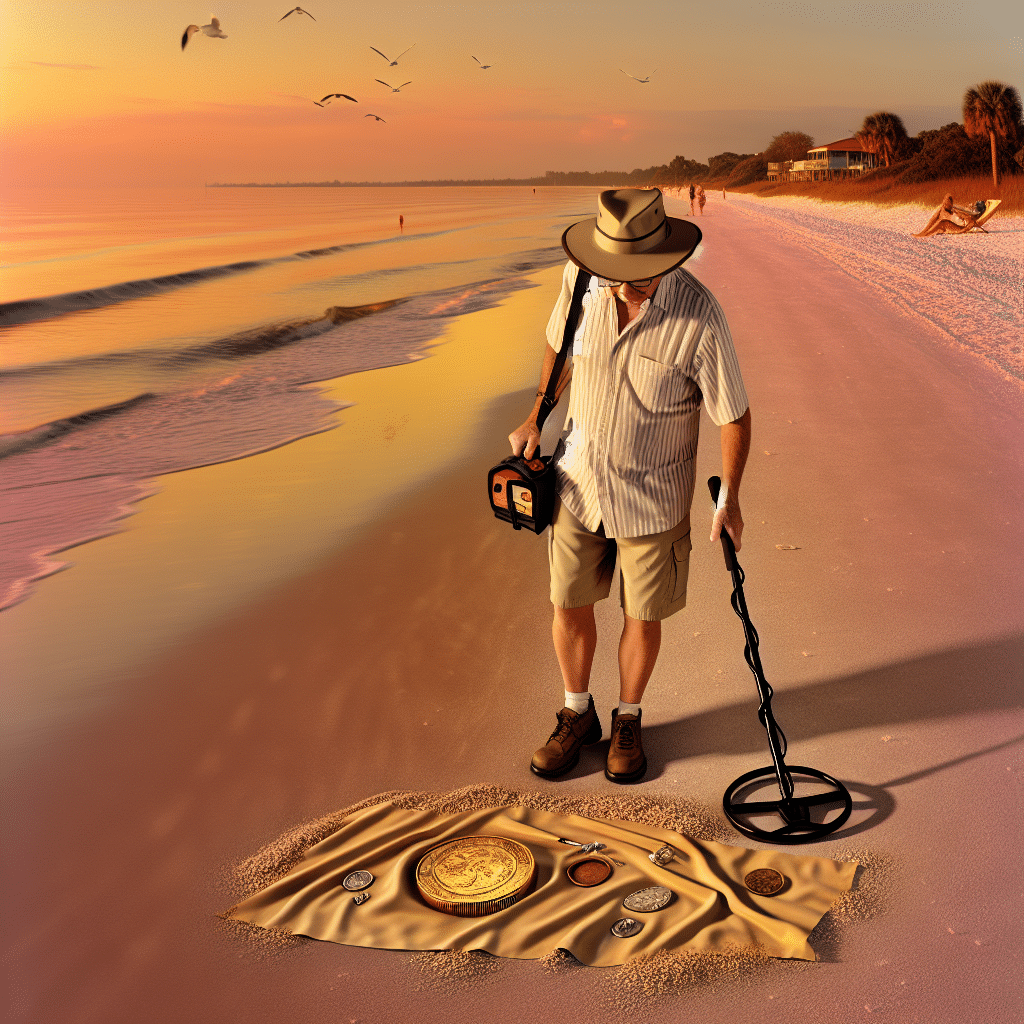The allure of finding buried treasure has been a part of human culture for centuries. While tales of gold-filled chests and pirate loot can often seem far-fetched, metal detecting offers a modern-day opportunity to uncover lost items and even historical artifacts. One of the most promising locations for such a hobby is along the scenic coastlines of Florida. Whether you’re a seasoned treasure hunter or a complete novice, metal detecting on Florida beaches can be an incredibly rewarding experience.
Why Are Florida Beaches Ideal for Metal Detecting?
The Sunshine State boasts over 1,350 miles of coastline, offering an extensive playground for metal detecting enthusiasts. Florida’s beaches are not just popular for their natural beauty but also have a rich history that dates back to the early Spanish explorers and pirates who roamed these waters. These historical interactions have left a multitude of artifacts buried beneath the sand, just waiting to be discovered.
Rich History and High Traffic
The combination of Florida’s historical significance and the high volume of tourists makes its beaches prime spots for metal detecting. Over the centuries, countless items have been lost to the tides—from ancient coins to modern jewelry. These beaches see millions of visitors each year, which increases the likelihood of finding recent loses such as rings, watches, and even smartphones.
Natural Events
Florida is also frequently subjected to natural occurrences such as hurricanes and tropical storms. While these events can cause significant damage, they also have the potential to unearth items that were long buried in the sand. After a storm, the shifting sands and strong waves can bring hidden treasures closer to the surface, making them easier to find.
What Equipment Do You Need for Metal Detecting on Florida Beaches?
Before heading out to the beach, it’s crucial to have the right gear to enhance your chances of finding treasure. Here’s a list of essential equipment:
Metal Detector
The most obvious piece of equipment you’ll need is a metal detector. There are different types of detectors suitable for various terrains. For beachcombing, it’s best to choose a model designed for use in sandy and, sometimes, wet conditions. Look for features like waterproof coils and sensitivity adjustments.
Headphones
Using headphones can help you hear the signals from your metal detector more clearly, especially if you’re at a busy or noisy beach. Many metal detectors come with a headphone jack, allowing you to plug in and focus solely on the beeps and tones that indicate buried items.
Digging Tools
Once your metal detector alerts you to a potential find, you’ll need tools to dig it up. A sand scoop or hand trowel is usually sufficient. For more challenging digs, a small shovel might be required. Ensure your digging tools are made of a material that won’t interfere with your metal detector’s signals.
Pouches and Bags
You’ll want a convenient way to carry any items you find. A waist pouch or small backpack can come in handy for this purpose. Additionally, having a separate bag for trash is a good practice to keep the beach clean and preserve the environment.
Rules and Regulations for Metal Detecting on Florida Beaches
While the idea of searching for treasure can be thrilling, it’s vital to be aware of the rules and regulations governing metal detecting in Florida. Different beaches may have varying guidelines, so it’s best to research the specific location you plan to visit.
State Parks and Protected Areas
Metal detecting is generally not allowed in Florida State Parks, especially in archaeologically sensitive areas. Permit requirements can be stringent, and violations can lead to hefty fines. Always check with the park’s administration before starting your hunt.
Public Beaches
Most public beaches allow metal detecting, though there may be restrictions in certain areas, such as near lifeguard towers or within specific zones designated for protected wildlife. It’s crucial to respect these boundaries and ensure you’re not infringing on any protected habitats.
Private Property
If you wish to detect on private property, be sure to obtain permission from the property owner first. Trespassing without permission is illegal and can result in penalties.
Tips for a Successful Treasure Hunt
Now that you have your equipment and are aware of the regulations, here are some tips to help make your metal detecting adventure on Florida beaches a success:
Timing is Everything
Plan your trips during low tide. This exposes more of the beach, giving you access to areas that are typically underwater. Early mornings and late afternoons are also less crowded, providing a quieter environment for detecting.
Test Your Equipment
Before heading out, test your metal detector on known objects to understand the signals it produces for different types of metals. Familiarize yourself with the tones and indicators so you’re not digging up every bottle cap or piece of junk.
Patience and Persistence
Treasure hunting requires patience and persistence. It’s not uncommon to go through extended periods without finding anything substantial. Don’t get discouraged; each beep from your detector brings you closer to a potential find.
Conclusion
Metal detecting on Florida beaches offers a unique blend of excitement, history, and the thrill of discovery. With its rich past and high visitor traffic, Florida’s coastlines are teeming with potential finds, from ancient relics to modern-day valuables. By equipping yourself with the right gear, understanding local regulations, and approaching each hunt with patience and enthusiasm, you’ll be well on your way to uncovering hidden treasures that tell the stories of Florida’s vibrant and diverse history. Happy hunting!




